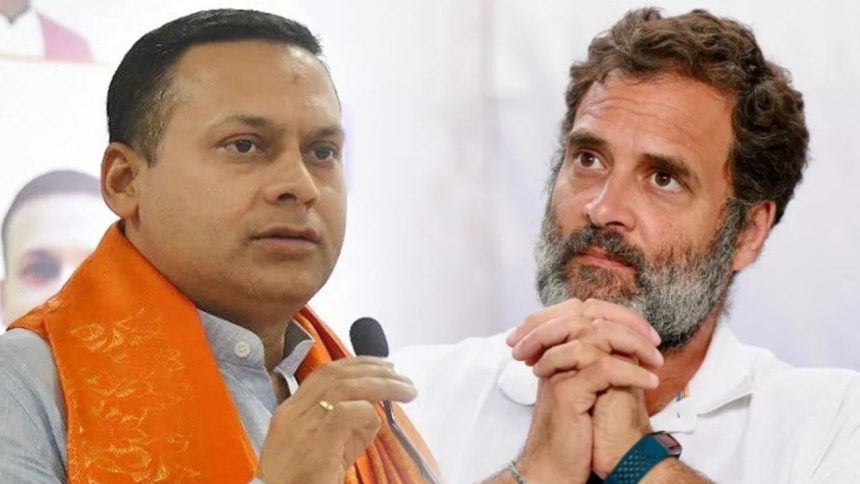
New Delhi: BJP leader Amit Malviya launched a full fledged attack on Leader of Opposition Rahul Gandhi. The Opposition leader came under fire for his claims regarding ‘Operation Sindoor’, which was a precision strike launched by the Indian military and air force against terror launchpads in Pakistan and Pakistan Occupied Kashmir.
Rahul Gandhi reminded of ‘Operation Brasstacks’
In a post on social media platform, ‘X’ Malviya talked about ‘Operation Brasstacks’ which was the largest military exercise ever conducted by India. He reminded Gandhi how this military exercise was “derailed not by strategy, but by political weakness”, taking a direct dig at then Prime Minister Rajiv Gandhi and the Congress government of the time.
Malviya talked about how General K Sundarji, who was one of India’s most visionary military leaders, launched Operation Brasstacks in 1986-87. This was a massive four-phase military exercise near the Rajasthan-Pakistan border. The aim of the exercise was to test mobile warfare, agility, and mechanisation and it involved nearly 500,000 troops.
Malviya said that this exercise was no secret and Pakistan was duly informed about it. The message was also conveyed to the neighbouring country at the SAARC Summit in Bangalore and then PM Rajiv Gandhi himself assured Pakistan’s PM Junejo that it was “just an exercise.” But despite the assurance, Pakistan moved troops across the Sutlej River, right up to Indian Punjab’s border and tension escalated at the border.
The information was shared with Pakistan before a formal agreement on sharing information about military movements during war or peacetime was signed with Pakistan in 1991, under a Congress-supported government, and later ratified in 1994, also during a Congress regime.
Malviyta said that on January 22, 1987, Pakistan crossed critical military thresholds. Meanwhile Khalistanis announced support for a separatist movement, raising fears of internal unrest. India was caught off guard and finally managed to deploy troops at the border on January 23. But, said Malviya, Rajiv Gandhi backtracked just a day later. The Congress leader reportedly announced that there would be no attack and the matter would be solved diplomatically. The BJP leader has questioned this sudden reversal.
He also answered it. He posted that Rajiv Gandhi decided to opt for diplomacy because Egyptian President Hosni Mubarak called him on a request by Pakistan’s Zia-ul-Haq. The BJP said that Rajiv Gandhi was eager to maintain his international image as “a man of peace” and hence quickly decided to withdraw troops. He withdrew the troops from the border, without any reciprocal action from Pakistan, said Malviya. The military action was also called off by the Congress under pressure from US, UK and other major powers, claimed BJP.
Rajiv Gandhi blamed General Sunderji: Malviya
The BJP leader then said that instead of taking responsibility for his act, Rajiv Gandhi chose to blame General Sunderji and Minister of State for Defence Arun Singh. The PM reportedly claimed that he “was kept in the dark” about the movement of the military.
After calling off the troop movement at the border, Rajiv even invited Pakistan leader General Zia-ul-Haq to India to attend a cricket match as a goodwill gesture. Next he went to Pakistan and signed the Agreement on the Prohibition of Attack Against Nuclear Installations and Facilities with Prime Minister Benazir Bhutto on December 31, 1988.
The Nuclear agreement came into force on January 1, 1991 and it requires both countries to exchange annual lists of nuclear installations and facilities, promoting transparency and aiming to prevent surprise attacks on nuclear assets. This move effectively exposed India’s nuclear capabilities. The act was termed as “appeasement” by Malviya. He also reminded Rahul Gandhi that his grandmother, Indira Gandhi had offered to share India’s nuclear technology with Pakistan in 1974.
Malviya advised Rahul Gandhi to revisit how his family repeatedly compromised India’s strategic interests—all for diplomacy dressed as surrender, before lecturing on military operations like Operation Sindoor. He told him that it was the Congress government which awarded the Jawaharlal Nehru Award for International Understanding to Hosni Mubarak, the former President of Egypt in 1995.










